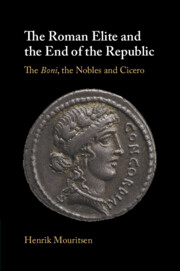Book contents
- The Roman Elite and the End of the Republic
- The Roman Elite and the End of the Republic
- Copyright page
- Contents
- Acknowledgements
- Introduction
- Part I The Boni in the Late Republic
- Part II Property and Politics
- Chapter 6 Wealth and Morality Revisited
- Chapter 7 Boni
- Chapter 8 Boni and Improbi
- Chapter 9 Otium and Tranquillitas
- Chapter 10 Vita et Bona
- Chapter 11 The Road to Perdition
- Chapter 12 ‘Egentes Sumptuosi Nobiles’
- Part III The Boni and the End of the Republic
- Appendices
- Bibliography
- Index
Chapter 8 - Boni and Improbi
The Moral Construction of Roman Politics
from Part II - Property and Politics
Published online by Cambridge University Press: 15 December 2022
- The Roman Elite and the End of the Republic
- The Roman Elite and the End of the Republic
- Copyright page
- Contents
- Acknowledgements
- Introduction
- Part I The Boni in the Late Republic
- Part II Property and Politics
- Chapter 6 Wealth and Morality Revisited
- Chapter 7 Boni
- Chapter 8 Boni and Improbi
- Chapter 9 Otium and Tranquillitas
- Chapter 10 Vita et Bona
- Chapter 11 The Road to Perdition
- Chapter 12 ‘Egentes Sumptuosi Nobiles’
- Part III The Boni and the End of the Republic
- Appendices
- Bibliography
- Index
Summary
The social role of the vir bonus explored in the previous chapter carried over into the public realm, where this figure was invested with moral qualities almost identical to those applied in the private sphere. Thus, being a bonus in the public domain involved a very similar set of expectations, with the only real difference being the setting in which the role was performed. The essential qualities of the public vir bonus were therefore entirely predictable and uncontentious. He was a decent and honest citizen, sound, reliable and responsible. Towards his fellow citizens and the common weal, he was innocens, never causing harm to either. As such he emerges as a figure who embodies trust, dependability and common good sense. As a responsible citizen, he is law-abiding, follows the rules and conventions and respects the authorities, temporal as well as divine. These fundamental characteristics were summed up in a fragment of one of Varro’s satires, which describes the duties of a civis bonus as ‘obeying the laws and honouring the gods’.1 The emphasis on adherence to the laws recurs in Horace’s portrayal of the vir bonus as one who ‘observes the senate’s decrees, the statutes and laws’, and in Cicero’s definition, presented in the De finibus, of the ‘good and wise man who obeys the laws and is aware of his civic duties’.2
- Type
- Chapter
- Information
- The Roman Elite and the End of the RepublicThe <i>Boni</i>, the Nobles and Cicero, pp. 105 - 123Publisher: Cambridge University PressPrint publication year: 2022

